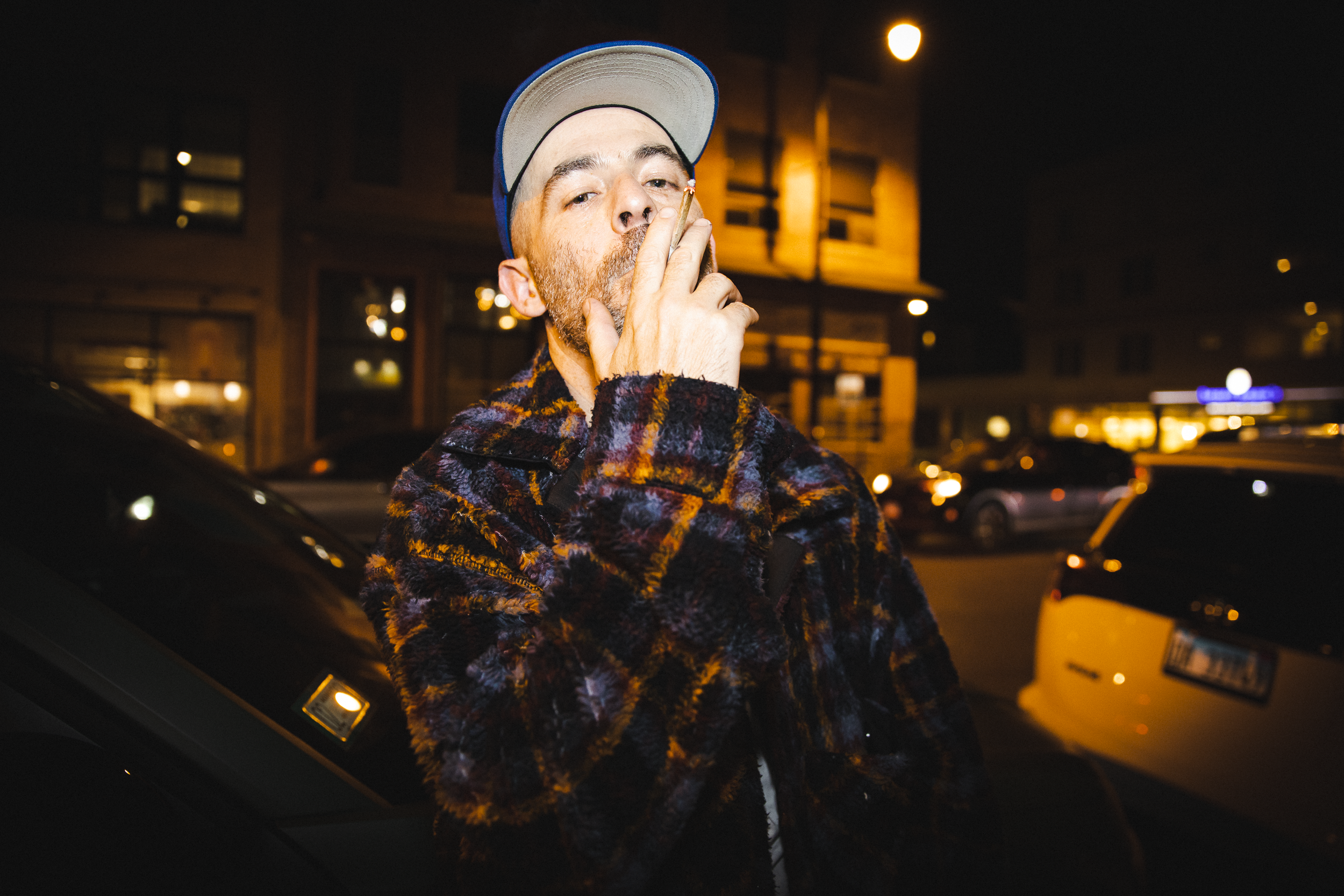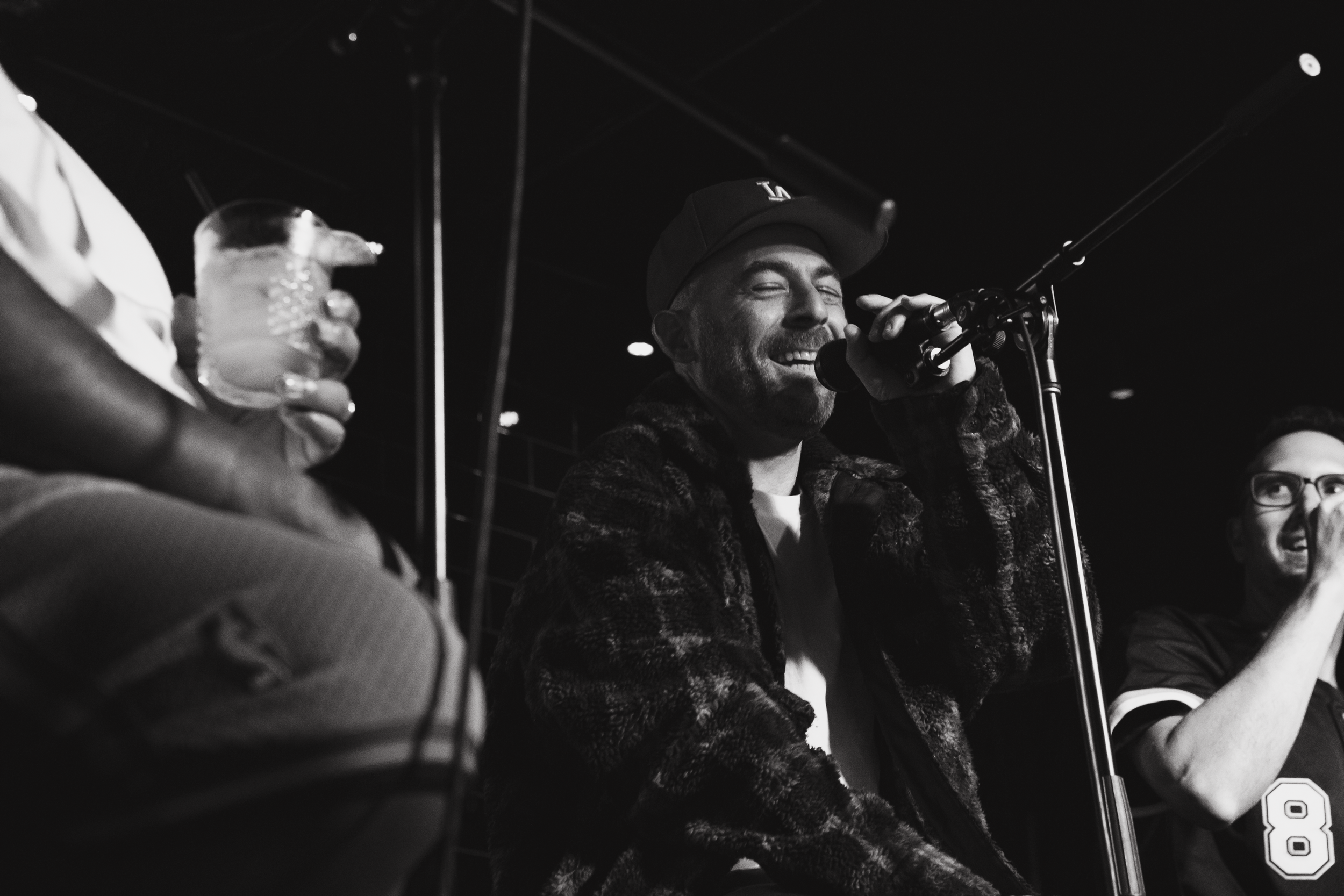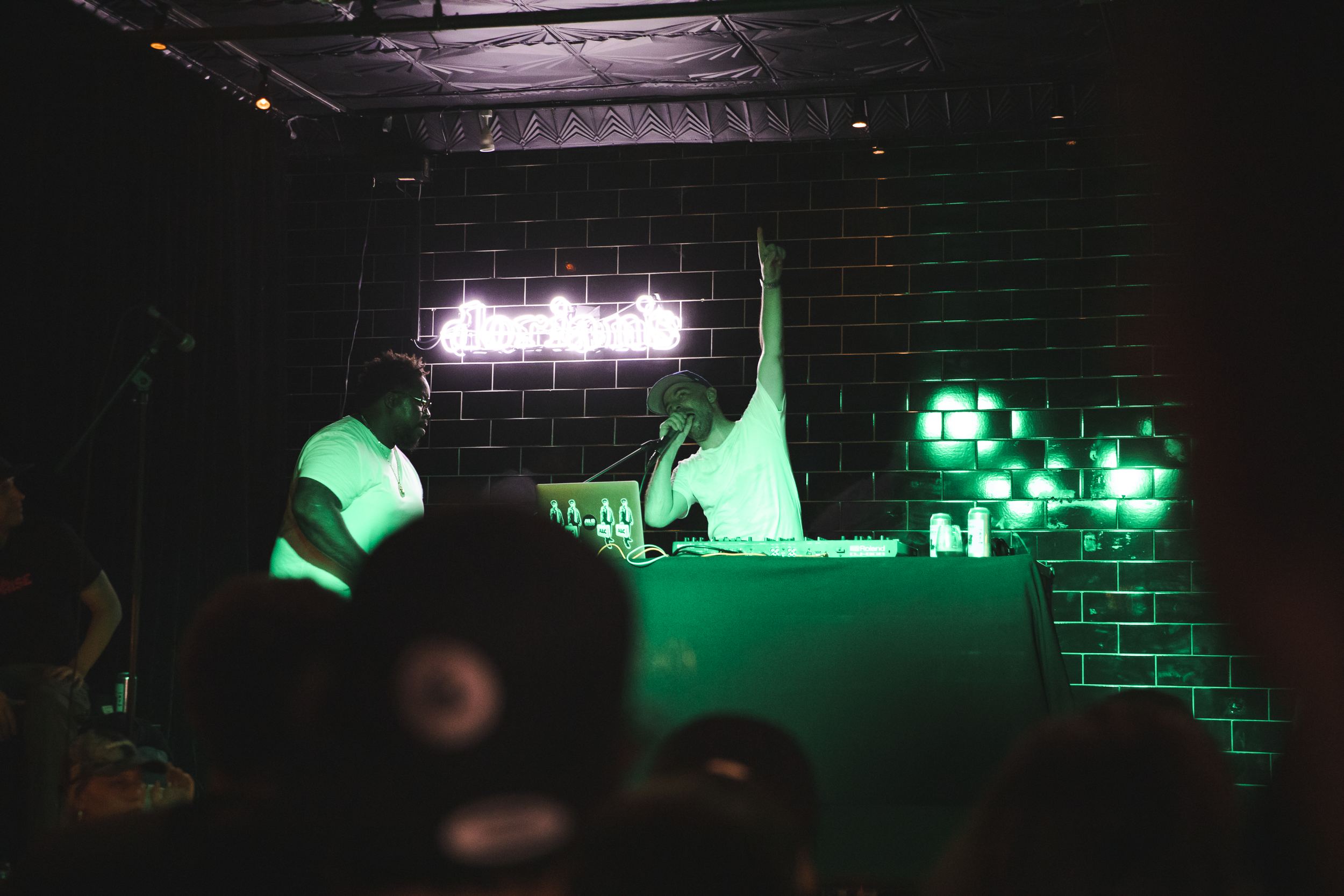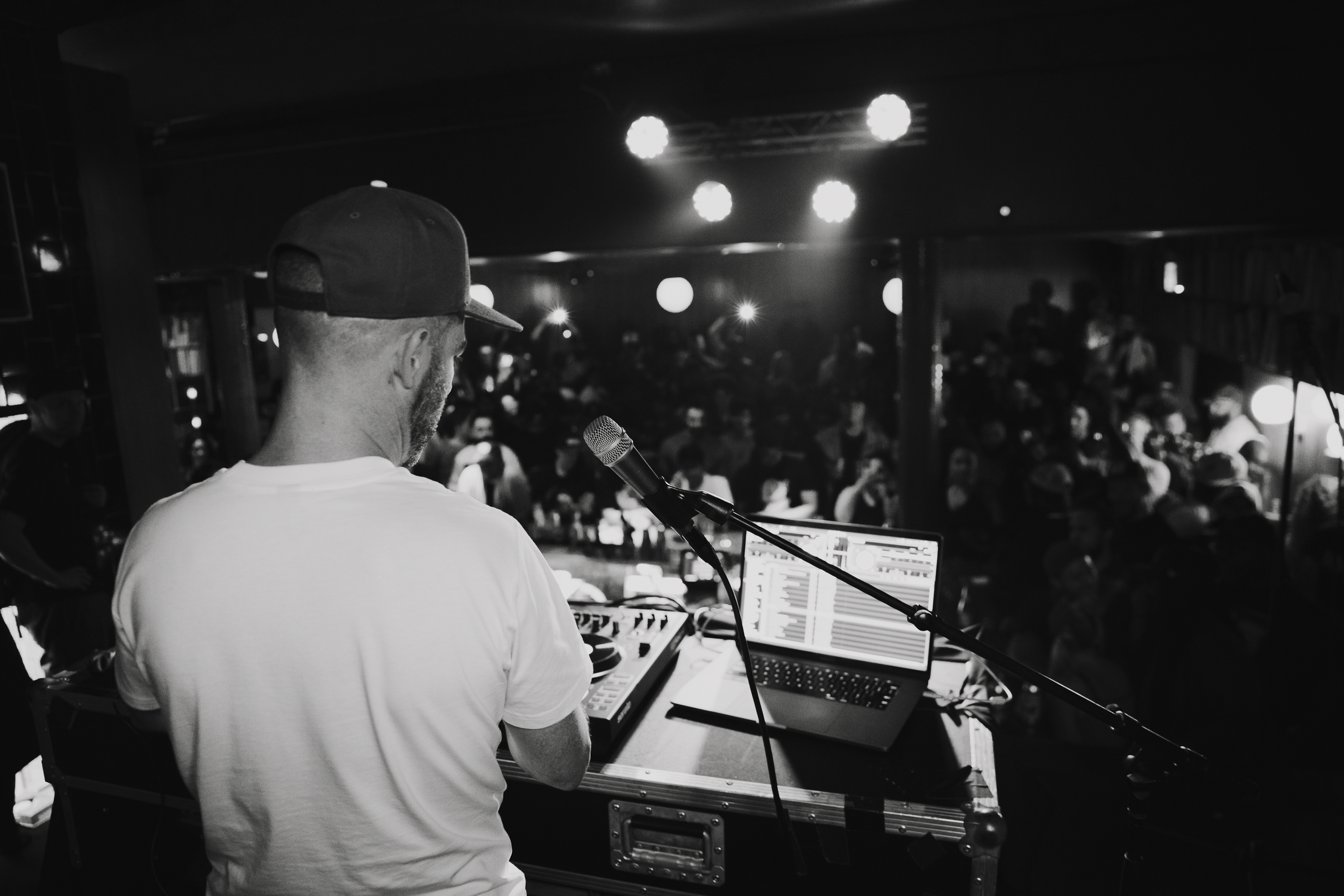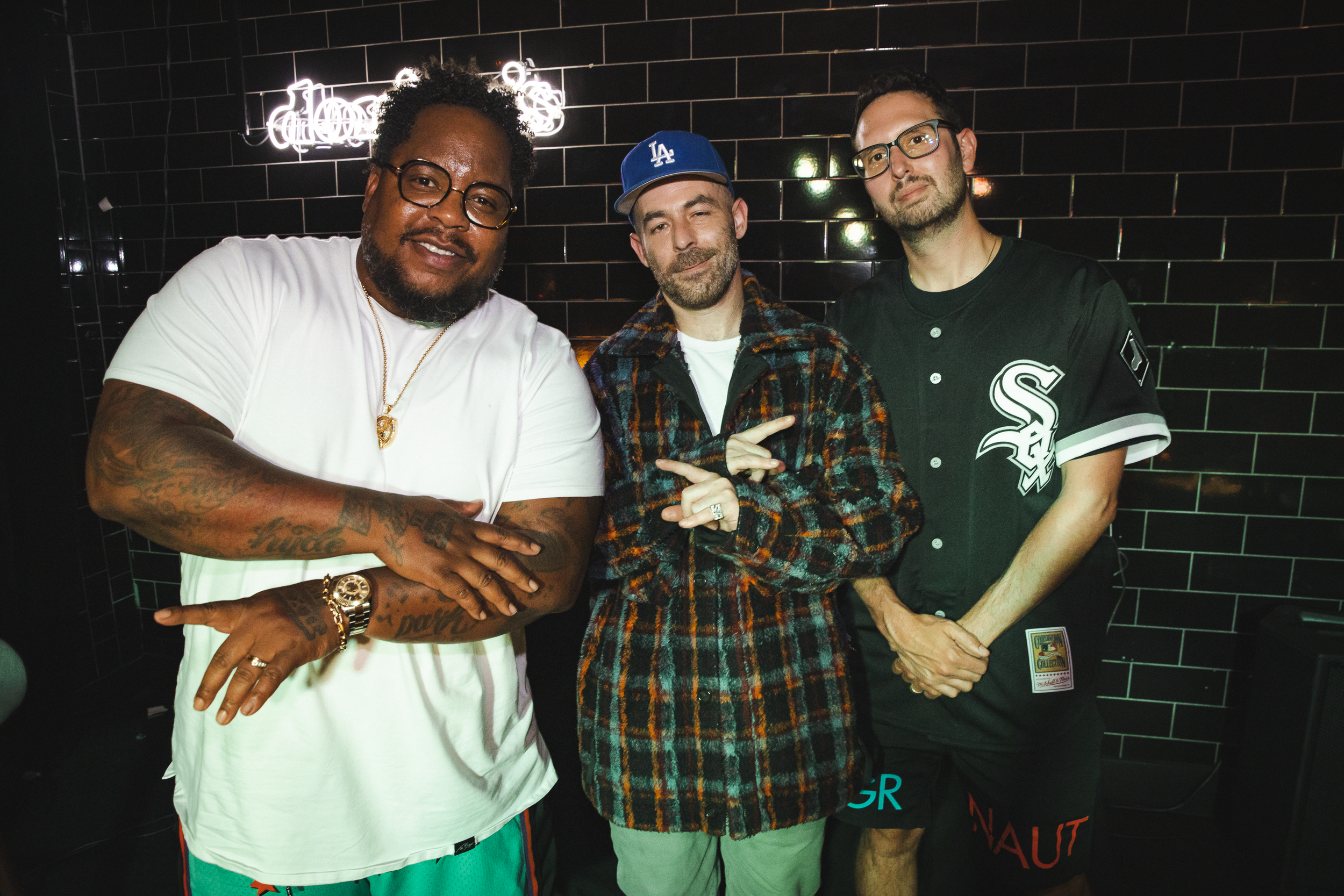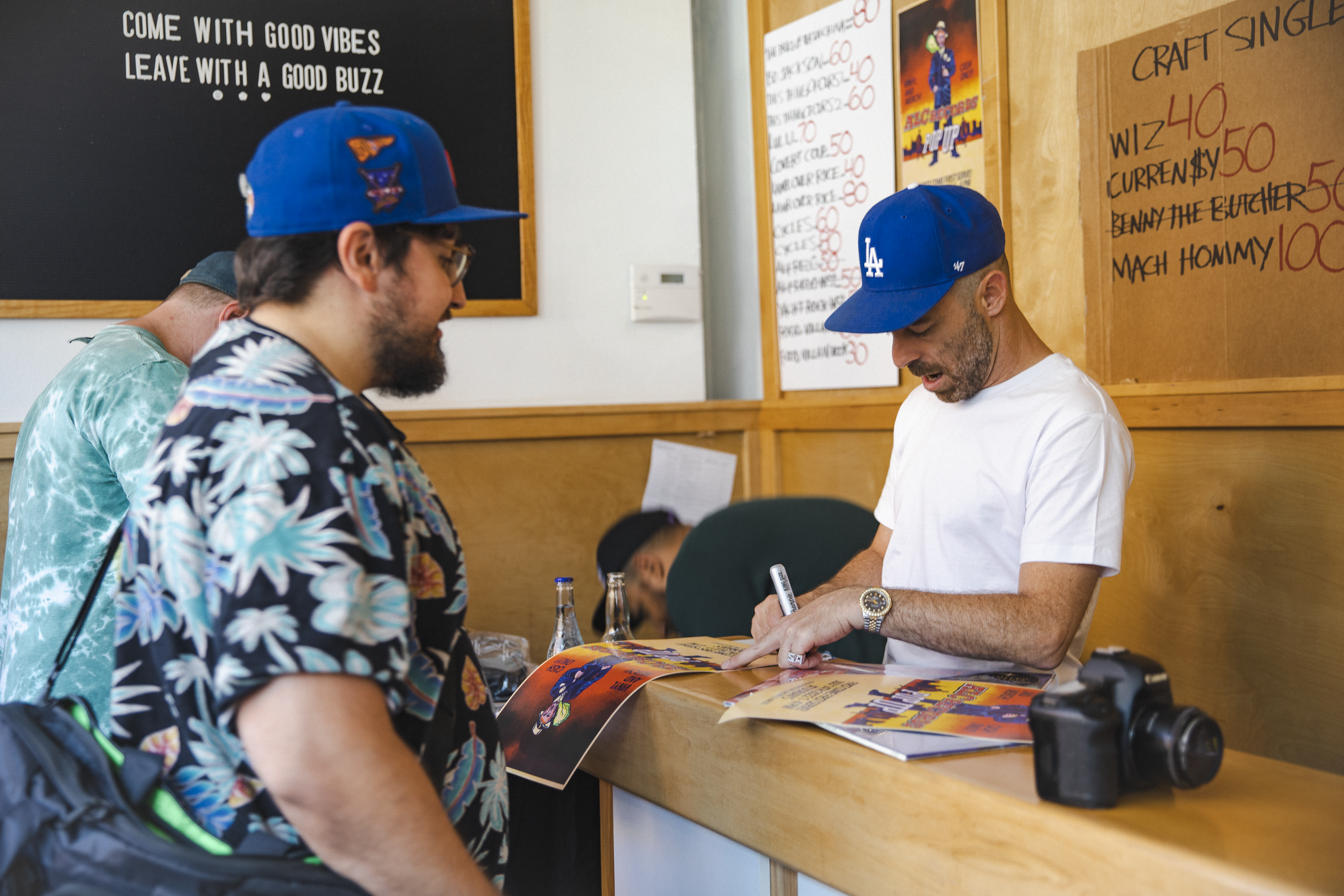[Interview] Inside The Alchemist's Laboratory
Note from RTC: This interview was originally done for Rock The Bells in the summer of 2020. Rock The Bells changed their design and deleted all my interviews. They appear here now and forever.
"I'm telling you I'm sick, man. I don't know what's going on here. You gotta keep up."
The Alchemist has been behind some of Hip Hop's most beloved productions, in 2020, he's more upfront than ever.
The Alchemist's career trajectory is pretty standard stuff. You know, the type of tale that is commonplace from small towns to the big city. His is the type of origin story as old as time and as continual as the horizon off the Pacific Ocean. I won't bore you by rehashing stories that I'm sure you've heard before with different names, but maybe a quick recap on the journey for young ALC... You'll see, pretty much all standard stuff.
The Alchemist grew up in Beverly Hills, CA. He remembers his first concert being U2 at the LA Coliseum. He was taken there by his older brother - pretty normal. He was aware of music as a young child, but says that he wasn't a music fan, maybe a casual listener. His mom forced him into piano lessons, and like a lot of boys of the time, he abandoned it quickly to play sports and chase girls, but not before being able to play "Mary Had a Little Lamb" with 1-finger. You know, very normal. Fun Fact though, his piano teacher was the keyboard player in The Knack, they had a song called "My Sharona", which was number one on Billboard's 1979 Top Pop Singles Year-End Chart.
Like most kids that ended up pursuing music, Alchemist can remember his "holy shit" moment. It happened upon hearing "Jam On It" by Newcleus. "That whole shit was mind-blowing," he told me over the phone, "like what is this? Some aliens singing?! I remember hearing that as a kid and being blown away."
The 12" vinyl for "The Show" with the b-side "Lodi Dodi" soon followed as the first record he remembers purchasing. From there, he was hooked on rap music. The logical next step for any young teenager who has just had their mindblown is to form a band or a crew and start making music with whoever they can find. Like most kids, Al did this with the people who just so happened to be around, such as Scott Caan, who's dad was in some films you may have heard of, including "The Godfather" (and the slept on high-water mark that is "Bulletproof" with Adam Sandler)?
Like most ambitious teens, Alchemist signed a record deal with Tommy Boy Records, missed a whole year of high school touring with Cypress Hill, and was taught how to make beats by DJ Muggs. When he describes it, it sounds as mundane as completing a New York Times crosswords puzzle on a lazy Sunday, or having a hotdog at a baseball game.
"I would go to Muggs' crib after school. We would just make beats. He would have crazy records for me to go through, he always had weed, he would give me $1,000 cash in little envelopes - money from the label - once a week, and we would go eat Benihana's everyday. I was living the best life ever."
See? Just basic teenage shit - in a rap group signed to the same label as De La Soul, envelopes of unmarked cash from one of Hip Hop's best producers, and missing school to go on a nationwide tour. All normal.
What?!
None of that shit is normal. The Alchemist's career and journey in the music business has been nothing short of exceptional, at times unbelievable, and 100% original. Perhaps the only thing that outdistances his unique come-up is his ridiculous amount of skill and the respect he warrants amongst his peers. I mean, many kids start out as childhood prodigies or are predicted for success, but few fulfill their promise and represent their mentors in a way that compares to "our pal Al."
Over the course of 3 weeks, and close to 10 interviews with Alchemist and some of the artists and collaborators that know him best, I explored the elements engaged in what is becoming one of the longest-running and successful careers in Hip Hop, one that is at a new peak in 2020. As Evidence, one of Alchemist's best friends, his longtime collaborator, and partner in Step Brothers put it, "That's hard. Very hard for somebody to do in the 3rd, 4th, or 5th stage of their career. That's not normal."
Through the fall and winter, it was an ongoing discussion for me and my peers, how Alchemist is having a banner run. Finally, on March 31st, Alchemist admitted it too. He tweeted the following, "I'm over 20 years in & arguably having one of my best years yet. Keep going, trust me!"
The tweet was motivational, and self-aware, and it sparked a discussion about how this came to be. "That's some interesting shit," says Evidence. This was the day after my initial interview with Evidence. He called me back out of the blue because he was still thinking about it the next day. Evidence knows Alchemist better than most, and even he can't really figure it out. "I think it's important for people to understand, he could have chilled at "Keep It Thoro", he could've chilled at "We Gonna Make It", Nas' "Book of Rhymes", he could've chilled right there and been straight and been a legend. But he kept going and kept going and kept going." Agreed.
Alchemist has indeed kept going, even though, as L.A. music writer and label owner, Jeff Weiss told me, "Alchemist was already a legend before he was old enough to shave."
As of this writing in 2020, Alchemist has released acclaimed collaborative projects with Conway The Machine, Boldy James, and The Cool Kids. He's also produced songs for Jay-Z and Jay Electronica, Eminem, Roc Marciano, Earl Sweatshirt, and West$ide Gunn. When you think about it, he's one of the few active producers to have produced for damn near everybody from damn near every era. He's the unofficial 4th member of Dilated Peoples, the unofficial 3rd member of Mobb Deep, had a hand in Cypress Hill's classic Temple of Boom LP, and is at the center of Hip Hop's current movement towards grimey street raps, which includes the sounds, sample styles, and artists he's been championing for years. As Peter Rosenberg told me after watching Alchemist recently on IG Live, "it reminded me of just how many different lives he's lived."
So, what's changed? What aligned for the Alchemist to achieve this notoriety, visibility, and resume after 2 decades?
"I don't know if I'm equipped to answer that," Alchemist tells me, laughing. It's the kind of laugh you do when you see something others haven't, when you know things will work out, possibly before the work has even started. "I could tell you, it wasn't really anything that I did differently. I didn't predict it, that's for sure," he says.
It's early Friday evening, on May 1, 2020. After a series of one-sentence emails, each almost vaguer than the last, I finally connected with the man, the myth, the legend. The one they used to call Mudfoot, perhaps the only producer to be seen as an architect of sounds from each coast, an artist that lived on both sides of the mainstream vs underground division during the height of that fucking division. I don't really know anyone else producing for High & Mighty and Jadakiss, or another producer that would put Dilated Peoples and Lloyd Banks on the same LP. I've spent hours reading over his credits going as far back as 1996, and my head is spinning at the range. Fashawn to Fat Joe, Bishop Lamont to Rick Ross, Action Bronson to B.o.B,. and La Coka Nostra to Lil' Wayne... And I didn't even touch on his group projects such as Step Brothers, Durag Dynasty, or Gangrene.
During the course of my study, I have found a few attributes that have poised Alchemist to succeed, some key internal and external factors that have led to a hall-of-fame career. Just like the science from which he pulls his name, it is quite the delicate mix.
Definitely one of Alchemist's key traits is patience, with just the right amount of stubbornness. It's not easy to stick to your guns and wait for others to catch up. He DJ'ed for Eminem for a long time before producing a true Eminem song. I know this because I first interviewed him in 2006 when he became Em's DJ. He told me then, "I've been with Em on numerous occasions. I never pushed him, 'check out this beat.'... Being a part of these kinds of teams that are just so huge, I just gotta sit on my hands. Believe me, my hands are making the beats while I'm sitting on them."
In addition to that, Alchemist sold Mobb Deep weed before they knew he made beats. And he's been working with a core of artists that the world is finally waking up to like the whole Griselda camp and Boldy James. But Al's been awake, both literally figuratively.
"If you know him, you know he doesn't sleepsleep," says Rakaa Iriscience of the group Dilated Peoples, a LA-Based trio that came to be synonymous with the Cali underground scene and sound. Rakaa has known Alchemist since he was a teenager and started coming around LA's Hip Hop shop with Evidence (Rakaa's partner in Dilated Peoples).
"I'd go stay at his crib in New York many times, fly out to NYC and go to work, stay at his crib and chill," Rakaa recounts. "His bed will stay made the whole time. He'll go into his room fully clothed, hoodie on, jacket, he'll kick off one shoe and lay down on top of his bed at 5am sleep until 7am, get up, brush his teeth, snap a bowl, and back to work. He's not an either-or type of person, he's just like, 'I'ma do more.'
DJ Premier agrees. "Al has one of the greatest work ethics. He'll go and go and go, you got to love it. I love that guy, he's like a little brother I never had," he told me via phone. "Even if it's 6am, I can facetime Al, he's going to pick up, he's definitely going to be blowing some trees, and we're both like playing each other's stuff on facetime... You can't do that with everybody."
DJ Premier also met Alchemist when Al was just a teen, running the smoke machine for Cypress Hill's live show, making sure the giant inflatable Buddha filled up fast and efficiently. Did you really read that sentence? Fuck! Alchemist was at one point the dude who made sure Cypress Hill's giant Buddha had enough air in it. This is an example of "get in where you fit in" gone horribly right.
"He'd already told me he was working on beats, cause Muggs was mentoring him, and before he got to the level of putting his name on stuff, Muggs was showing him the ropes," Premier recalls. "We went on tour together when Alchemist was a roadie for Cypress Hill. During all of that tour, our tour buses would pull up at the same time, and we'd always hang out together and we just became buddies. We would always smoke, and he would tell me about the beats he was working on. 'I gotta play you some stuff.' And then when the ["Open Mic Night"] remix came out, I was like, 'oh, this is nasty.' I liked his version better than the original, and he was starting to make some noise. And then I took him to my D'Angelo sessions when I was making "Devil's Pie"."
That "Devil's Pie" session birthed this photoof Premier, Dilla, D'Angelo, and a young Alchemist fresh off dropping out of NYU and ready to breakthrough with Mobb Deep. Side note, he also got invited to that session because D'Angelo kept badgering Premier to "bring that kid back, the one with the California weed."
While Premier is more humble or modest, and prefers to think of Alchemist, "more like another good friend that I acquired in my life," instead of as a mentee or protégé, Alchemist is quick to recognize Premier as a major influence.
"That's all I wanted to be, like Premier," he says. "I used to buy albums and if I see Premier's name, I'm going right to that song, and that's gonna be my favorite song on the album. That was what I wanted to be. And that was my goal. I always told Preem, that's what I got most from him. I knew I couldn’t do his sound, nobody can. But his reputation, and how he was on albums, that's what I always wanted to be. 'Oh, you see the name?' It's definitely gotta be something. May not be the hit, but it's the one that's gonna hit your heart. It's gonna be that hard shit, whatever it is, it's special."
That evolution did not happen overnight either. Evidence explains, "a lot of those [early] beats were, not mockeries, but they were highly influenced by whoever he was inspired by at the time. So, if it was Large Professor, he had some shit that sounded like Large Professor. Pete Rock, same. Premier? Especially. He wasn't imitating, but he was, I think, emulating. It was obvious what he was going after when I would hear the beat, 'oh that's some Premier shit... oh, that's like some Pete Rock shit.' To me, his originality hadn't happened yet. What was so dope, was how good he could do that! Because, you know, just to be able to make something that sounds like Premier, without just ripping it off, that's a skillset in itself."
Eventually though, Alchemist broke through. Evidence says it was around the year 2000 when Dilated Peoples finished their debut LP, The Platform. "I tell people all the time, if you want to see how a car's built, take it apart and put it back together. I think that's what he was doing in his early stages, kind of emulating those tracks - figuring out how everybody was doing what they're doing. I think once he figured that out, he moved past it and started to form a sound that I hadn't heard before. It was still directly influenced by his inspirations but it no longer had that emulation feel. It moved more into innovation. At that point, I was like, 'this is some shit.'"
You know how a lot of Jews wrote the most famous Christmas songs? Have you ever thought about that? I don't know if it's because they had an outside perspective on the holiday or were not taking it too seriously, or maybe they were just great songwriters. Before you think I'm totally off-track, let me bring it back to Alchemist. I think the article would be remiss if I didn't touch on how even though Al is from LA (and a defining part of an LA Hip Hop sound), he also soundtracked an era of New York rap, some of the most recognizable NYC records with some of the Kings of New York.
"The New York sound was like, it hit us in a crazy way. I don't know how it happened, but it was like, thatNew York sound,thoseproducers, Diamond D, Large Professor, Pete Rock, The Beatnuts, EPMD, The Beatminerz, Q-Tip... that sound fucked me up more," Al explained to me. And while he "officially" went to New York to attend NYU for college ("I'll be honest, I didn't even apply to another school"), he unofficially went to test his mettle in the Hip Hop mecca. He had to put himself in the center of it all.
"He left LA to go to New York to go to college," Evidence remember. "And he told me one day, 'I'm going to chill on rapping. I'm going to really move forward with this production shit. I'm gonna call myself the Alchemist.' Something about it just really rang right away. As a homie who was used to something, I could've been like, 'nah...' or 'I don't know if that's gonna work bro,' or whatever. But when he said that, something about it was like, 'bet, that's gonna work.' and it did."
Alchemist thinks fondly of his early days in New York, a time when he came into his own. He walked the streets charged up, ready to put his foot into the production world.
"I didn't have a musical identity prior to moving to New York. I was kind of just making music," he reflects, almost doing so in verbal bullet point form. He's connecting the dots for me on the phone. Try to read the following as short darts or perhaps a grocery list. "I was already versed in all of that shit. Premier was my idol. Muggs was my teacher. I had so much shit, that once I got out there I really felt anointed. I'd walk through the streets with headphones on listening to Large Professor's "The Mad Scientist". Walking the streets of New York like, 'ah, yeah, it's on. I'm immersed in it now. I'm here now. This is the sound. Ok. Stretch and them, they're playing thatshit, on thosenights. I know Stretch now cause of Mighty Mi. I did a beat for High and Mighty, they're playing my shit on Stretch and Bobitto. OK. I know Premier, that's my big homie.' Even before I met Mobb, I felt I was there for a good reason."
Dante Ross was around during Alchemist's NYC days. He remembers that he was initially put onto Alchemist a few years before when Everlast or Muggs told him they were down with "a white kid who sounds like a teenage Grand Puba." Ross lived a few blocks away from Alchemist during the New York days, and would refer to Al's crib as The Post Office because of its proximity to the postal depot. He would go over to Al's place to chill, make beats, and pick up weed and now considers Alchemist a hero. "Al's a hero cause Al does everything on his own terms. Al never played the game, the game comes to Al," Dante explains to me, in reference to this tweetfrom 2014. Like pretty much everyone else I talked to, Dante admires Al's stubbornness and unshakeable determination to do things his own way, which is another key to how he's able to move throughout the music industry.
"He is definitely someone who could get put in a backpack bag, but somehow it's Al's bag and it's not a backpack bag. It's his own thing, and it works for him," Dante says. "He hasn't really changed what he does that much, he pretty much just does what Al does. It's been pretty consistent and brand on, and it's because of that brand, the whole world came back to Al. He was pistol hot in the early 2000's, but rap went another wave and Al rode the wave out and look at him now, he's in the middle of all this cool shit."
I hope by now that you can begin to better understand how Alchemist has been able to have such lasting staying power. He's incredibly talented and he learned from some of the best. Jeff Weiss likens Al coming up under Muggs and Premier as "the equivalent of learning to smoke weed from Willie Nelson and Tommy Chong."
Additionally, we've learned that Al never chased the trends. And, as I mentioned above he's stubborn. "I'm real stubborn anyways, so I'm going to make the type of shit I like, and if me trusting my handle with things I like means success because other people like it too, I'm gonna just stick to that."
All of the above traits - following your gut, not selling out, and patiently waiting for a time to shine are also all core tenets of Hip Hop. Since the day he discovered and dove into Hip Hop, Al has also lived by its codes. And through that he's gained acceptance, honed his skills, and become a mainstay.
Alchemist also works at an extremely prolific pace, which, as Rakaa says, "He doesn't give you an opportunity to hate."
"His organizational skills are huge," Evidence told me to adding to my list of attributes, this one possibly the most surprising to learn. "I notice a lot of greats that I've seen in the game aren't the most organized, and because of it, they can suffer. Everything's documented. All his records are always clean. He's got a list. He's got a system. He's got an idea and he sees it thru, overly driven. The organizational skill is crazy with him. And I think in this modern day, how he's really killing shit."
This branding and organization are key elements of Al's success. He has been in the actual music industry since he was a teenager and he's made keen observations. "I was always business minded, not just creative. Even as a kid, I always had a hustle mentality to make moves and do stuff. I was aware of the music industry, but it was never what governed me. And you could see that's how I moved in my career. I didn't make moves based on money."
The biggest motivation for Al seems to have always been the name recognition, but not in a self-serving way. It was more about the props, the respect, contributing to Hip Hop and being hailed for it. Having his name synonymous with something dope. Rakaa possibly puts it the best, "He understood that before there was a plaque on the wall, a platinum symbol next to your name on Billboard, or your bank account reflected all that, everything was just a beat. You had to make that batch that connected with people. I think he goes into every session that he does, whatever song he's going into, with the goal of maximizing the potential energy of the situation, whatever that is," Rakaa adds, "If it boosts record sales, and grabs a plaque that makes him create some more wall space, that's cool, and if it’s a situation where it's just more respect in the underground, then that's cool too. I think that's what it is."
Alchemist dealt with enough labels and artists during the course of his career to start to understand the mechanics. Just as he "took the car apart" to develop his own production style, he did the same on releasing projects and creating product. Admiring the taste of labels like Stones Throw and Curtom, as well as series such as Madlib's Medicine Show, Al decided it was time to expand the name and expand the brand. The result is ALC Laboratories, the label through which he releases his instrumental projects, limited vinyl, and collaborative albums.
"I had my own deal. Before that I was doing beats for Dilated, it was on Capitol. I worked with Mobb Deep through Loud, I had experiences as a producer with a lot of different labels and I think overall it made me realize what it was, and it wasn't, til later in my career where I started realizing, 'what do I have now? What's left? OK, I worked with all these artists, I made beats for everyone, I got down with a bunch of people because all those years I was trying to make beats for different people and I looked at my name, Alchemist, as my reputation, and my brand. I looked at it like, 'alright, it doesn't matter where it is. If it's on this album on this label, or with this artist on that label, it never really mattered to me as long as I did my type of beat, and it was how I wanted it to be. It represented me."
Alchemist unlocked some key doors on how to function as a producer that produces more than just beats. Inspired by his own collector tendencies - during our interview he references this rare Billy Ripken cardin which Ripken's bat was caught with the phrase "fuck face" on it - Al now releases the type of music and collectible items that he would want as a fan, and he finally has nobody that has to keep up with him. He can release music whenever and however he wants. "I think it comes down to being able to control my career a little more and put out music when I want to put it out through my own label, and being able to control the flow. I pretty much work at the same rate I've always worked. It's not like I started working harder."
Alchemist says it was working with Curren$y on the blog-era classic, Covert Coup,that gave him this push to release music regularly, and think of multiple revenue channels. Legend has it that label politics was severely slowing down the release of Covert Coupuntil Curren$y suggested they release it themselves online. "He convinced me to put it out, and I was so shook cause I didn't know how to do that," Alchemist recounts, almost laughing at the situation. "Curren$y said, 'nah, we're gonna put it out [for free] and I'll let you eat off the merch, cause I got a good thing going with the merch with Diamond Supply. We'll do a capsule.' And I'm like, 'put an album out for free, and just sell merch?!' I couldn't wrap my brain around it. And then we did it, he convinced me, which was the greatest thing ever because he pushed me into that world of just putting out music and coming up with inventive ways to get bread off of it. It did very well, and it opened me up to a whole new world of kids too who were like, 'who is he?!' I didn't realize how his network was at the time. That was the first one where I really felt like, 'oh, OK, I could do it.'"
"I didn't think Alchemist would even fuck with me," Curren$y says when asked about Covert Coup. "Things were just bubbling. I'm underground til I die, but I was under underat that point. But he knew who I was, and I wasn't expecting for him to just open doors like that."
That's the next, and possibly final major element of Alchemist's success. Well, final element other than the fact that he is other-worldly talented. As Chicago DJ, producer, and organizer of pretty much every Alchemist Chicago performance since 2007, Rude One says, "He's a scientist, dude. You know, a lot of that shit might just sound like a loop to you, but it's not. Like, you really got to unearth that and be like, 'wait a minute. He did what?!"
"His stuff manages to be really sample heavy and funky," says Peter Rosenberg, "but also have a big sound. Like he's just... he's just really, really good."
So yeah, I didn't mention how good his beats are or how Premier calls him an amazing digger, or how Dante Ross says that Alchemist is the biggest tech junkie he knows beyond Just Blaze, or how Evidence and Rakaa both keep telling him to rap more, cause I wouldn't even be writing this article if Al's skills weren't next level. But he has those intangibles. That's the real gist of it.
When all is said, and done, Alchemist is a really good person. He's fun to be around, and he makes artists feel comfortable. Take Evidence's description of a typical studio session at Al's place, "He's got the wine popping, he's got the weed flowing, he's an amazing host. When he's tired, he goes to sleep without telling anybody, and that's everyone's cue to get the fuck out. Very selfless and looking out for people."
The other piece of it is that Al is never high on his own supply. Although he may be from Hollywood, he's never gone Hollywood.
"His personality kind of unlocks you. You're able to perhaps touch on things you wouldn't have lyrically because you're not worried about who you're around," says Curren$y, "Everybody who you respect, respects Alchemist. So, you walk into that situation a certain way. You're honestly just honored that he's fucking with you, and you really don't want to waste his time."
That was a theme that came up throughout my interviews. The importance of time. I knew going into this interview that Alchemist kept crazy hours, and in one of my attempts to get an interview done, I told him I only really need 10 minutes to get a few quotes. He responded that I could have as much time as I wanted. But because of who he is, I knew that I should only take what I needed. "Somebody's making a beat right now," he said as we started to wrap up our near hour long conversation. "This whole hour, somebody made a life changing beat. We had a great conversation, but somebody just changed their life in this hour, it could've been me and you... This interview could change our lives."
Alchemist does his music making now from his home studio. Something that has been referred to as "rap camp" by the likes of Action Bronson, Freddie Gibbs, and other frequent visitors. Evidence says that the vibe has always been the same whether the studio was a one bedroom apartment in New York City, or his parents-house way back in the day. The current iteration is meant to loosen everyone up, and create a space for innovation. One that takes influence from his early days with Soul Assassins, even earlier days with QD3, and his appreciation of the Beastie Boys.
"I was a big fan of the Beastie Boys and the studio they had in LA was infamous," Al says. "I never had a chance to go there, but that experience that they had stuck in my mind forever. Hearing about the studio they had, which had an indoor basketball court, it had a half-pipe, it had a studio... that was what really inspired me to do what I do these days. There's so many elements that go into making music, it's not work. We work hard as fuck, but this ain't work."
For someone who works so hard, Alchemist definitely makes it look easy. This mix of pure skills, a deep passion for Hip Hop, and a personality that is simultaneously calming yet respect-demanding has taken Alchemist to unprecedented levels and created a lot of great records. I end my interview with Al by telling him some of what others have said about his biggest skills. I ask him for his take, waiting for him to reveal the secret. He pauses, and says, "I think all that leads to another road, which you could sum it all and say, I'm out of my god damn mind."
Yeah, it could be that too.

